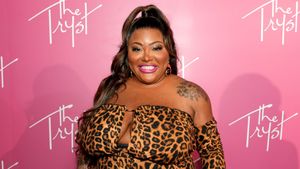"Break the binary."
More and more, that simple slogan has come to define the ethos of the queer community. It’s a phrase that illustrates our desire to change society’s tendency to see all things as a push-pull between two opposed extremes. Man or woman. Gay or straight. American or immigrant. Person of color or white. Liberal or conservative. Right or wrong. For so many LGBTQ people, part of being queer is realizing that the world cannot be simplified into binary categories. We are a rainbow of viewpoints, cultures, and experiences.
There is perhaps no part of the queer community that understands this better than transgender folks (like me). From the day we realize that we are trans, we start to see how gender, something that so many people see as immutable, is actually incredibly versatile. We move across boundaries, sometimes going from one "extreme" to the other (like man to woman) or finding our place somewhere else along our personal gender spectrum. Breaking the binary is a common extension of our experience.
But despite the ability to stop seeing the world in black and white being part of the trans experience, I’ve found that there is still one major viewpoint in the community that relies on binary thinking. It’s one that makes perfect sense and that I completely understand. Yet, I think it also limits our ability to understand our own experience, as well as help others find their own ways to understand their own gender: the idea that one is either transgender or cisgender.
The words cisgender and transgender have grown more common in recent years. Cisgender has been defined as "denoting a person whose sense of personal identity and gender corresponds with their gender assigned at birth." If you feel comfortable with your gender at birth, then you’re cis. It stands in counterpoint to transgender, which is defined as "denoting a person whose sense of personal identity and gender does not correspond with their gender assigned at birth." If you feel uncomfortable with your assigned birth gender, you’re trans. The words come from the prefixes -cis, meaning "on the same side as," and -trans, which means "across."
The other important thing to note here is that cisgender and transgender are adjectives, not nouns. They’re descriptors, in the same way that words like tall, short, small, and big are. It’s why we say that someone is a cis man (two words), not a cisman (one word), just as we don’t say transwoman, but trans woman. It’s to say that there aren’t transwoman versus ciswomen, but women who happen to be cis or trans.
The whole point of the using the term cisgender is to create an equal counterpoint to transgender. The reason the term cisgender exists is because, without that terminology, transgender people can easily be otherized. When you see people as "women and transwomen," or "men and transmen," it creates a distinction between the two. It says that being transgender is "not normal," which is demeaning to the trans community. Saying you’re cis stops the normalization of a non-transgender experience. It says that we can be women, who happen to be cis or trans, or we can be men, who happen to be cis or trans. (And technically though, you can be any other gender but be cis or trans, because few ever get assigned a gender outside of woman or man at birth, you probably won’t see a cis genderqueer person.) Being trans isn’t crazy, weird, or dehumanizing. It’s just different from what many others experience. Yet it is just as legitimate a way to live as any other. Using the terms "cis" and "trans" is just a way to stop the otherization of trans people and normalize our experiences.
As confusing as this may be to many, it makes perfect sense for us to distinguish between trans and cis people. Apart from breaking down the idea that being cisgender is "normal," it allows trans people to find community. It helps us band together, either to help each other or to fight back against those who would harm us. The label also gives us a way to talk about our experiences in a way that feels comprehensible. On top of all that, it lets us talk about the privilege that comes with being cisgender. To discuss how many cisgender people have the ability to move about in a world without having your gender be questioned, attacked, or delegitimatized by governments and individuals.
Yet, I still feel a hesitation at simply defining people as either transgender or cisgender, because in the end it’s still sorting people into binary distinctions. It’s saying you’re either one or the other. Using cisgender rigidly seems to promote this idea of us versus them. Cis versus trans.
The terms become even more blurred when you look at an individual experience. Certainly, as someone who was told I was a boy at birth but transitioned to a woman, I’m transgender. Yet, for years now I have felt completely comfortable in my body and gender expression. I have no desire to change anything about myself, at least in terms of gender. So while comparing myself to who I was at birth, I’m trans. But if you compare who I am today with the person I was three years ago, wouldn’t I be considered cisgender?
You could say the same of a cisgender person’s experience as well. A cis woman may have no issue identifying as a woman from birth. Yet, they may have been a tomboy when they were a child, and today may be hyper-femme. Certainly, their gender hasn’t changed, but I would argue that part of their gender expression could certainly be discussed as transitional.
Perhaps it’s actually more useful to talk about how someone is trans or cis. By doing so, we can talk about how some experiences of gender and identity privilege some while harming others in our society. It can help us better change the world around us so that all of us can feel like we belong.
In the end, I know a lot of my arguments fall deep into the esoteric. It’s all so academic that for the moment it seems irrelevant. It’s still important, especially in a political climate where transgender rights are constant attack, to work together as a community. We need to form safe spaces and have political discussions as a group. Yet, I also feel that this conversation of what it truly means to be cis or trans, and if we can somehow be elements of each, is an important one. We all change and adapt who we throughout our lives. We are no more the same person today that we were at birth then the person we will be by our death.
Language helps guide conceptualization. It’s the same reason why people who speak languages with various words for the color red can actually see more distinctions between that color in the real world. The more ways we have to talk about our experience, the more we are able to actually understand our world. To deepen and enrich our understanding of the word cis and trans isn’t just conceptual. It can change the very way we understand ourselves and break the binary of what it means to be human.
Jessie Gender is the host of PRIDE's Nerd Out and is also a producer on the YouTube series Microsoft Unboxed. For more nerdy goodness from Jessie, check out episodes of Nerd Out here!
































































































































